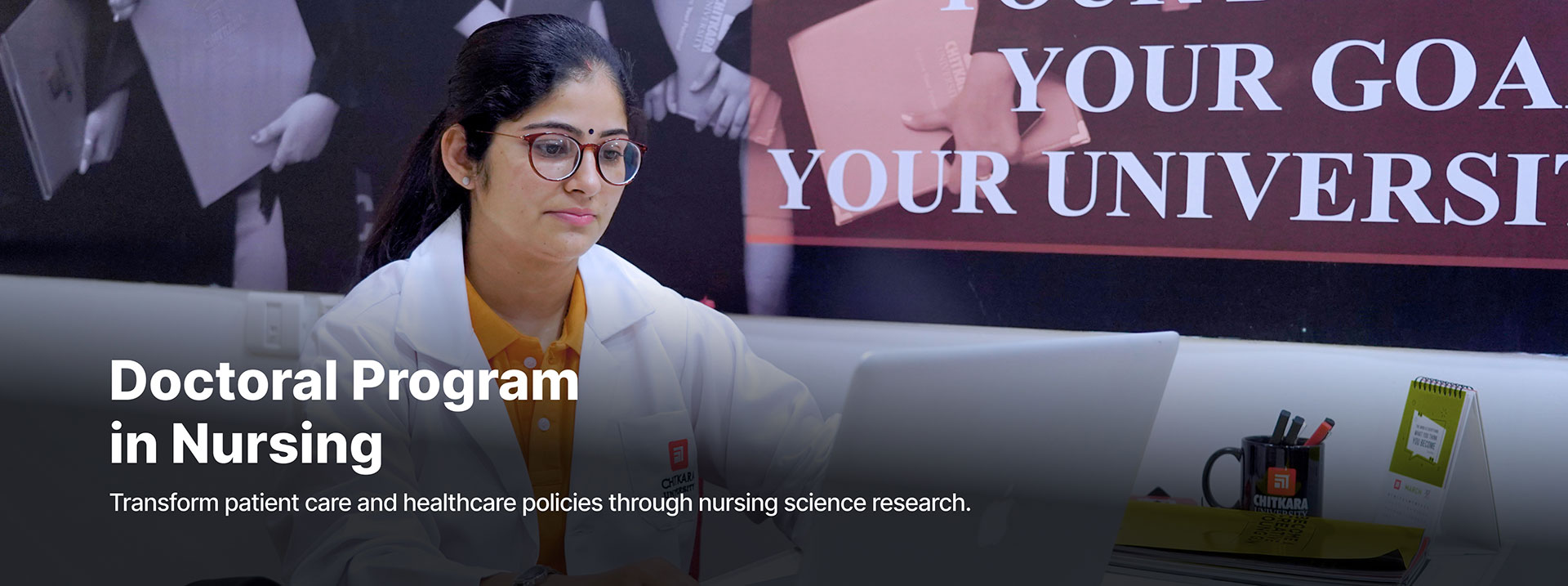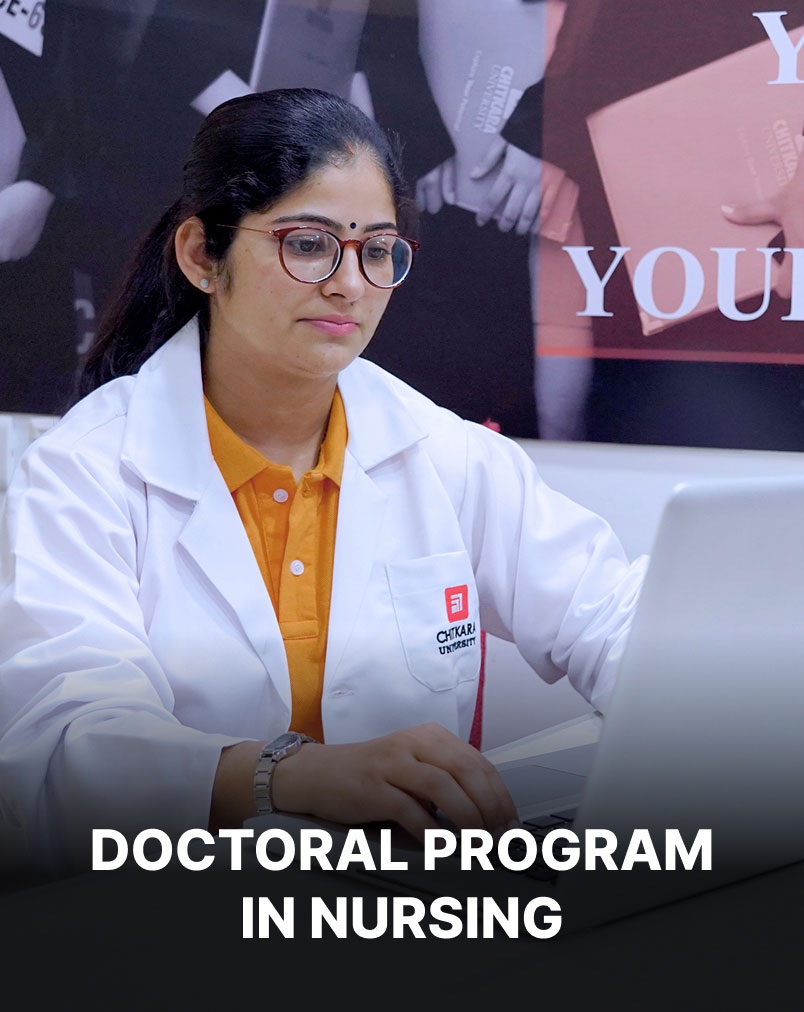PhD Program in Nursing
The Chitkara University School of Nursing PhD program is a research-intensive curriculum that prepares nurses for careers as nurse scientists who will conduct research across a broad range of populations and health conditions. Importantly, much of our research is focused on health disparity population with the long-term goal of informing health policy and clinical practice across the lifespan.
Our PhD program provides students with an understanding of the philosophical and theoretical underpinnings of nursing science and a strong foundation in research methods (design, statistics, measurement, quantitative and qualitative methods) for clinical, translational and health services research. All students are mentored by research advisors with active programs of research as they move toward independent research and assume the roles of doctorally prepared nurse scientists.
The program emphasises interdisciplinary collaboration, enabling engagement with experts from various healthcare fields to address complex health challenges. With access to cutting-edge facilities and resources, the program cultivates expertise essential for advancing nursing education, clinical practice, and healthcare policy. The program also provides opportunities for students to contribute to community-based health initiatives, enhancing their practical impact in diverse healthcare settings.
Be a part of India’s Top Rated University
Program Overview
Doctoral education builds on prior competencies, focusing on theory development and research skills. Nursing scholars are expected to lead in healthcare and education systems, develop a solid foundation for nursing practice, conduct research, and influence healthcare policy. The aim is to foster professional development and promote evidence-based practices for clinical effectiveness.
Key features of the doctoral program in Nursing include:
- Applying theories, methodologies, and knowledge to address key questions in their field.
- Conducting research of significance, either within the discipline or through interdisciplinary projects.
- Managing complex ethical issues and making informed judgments based on ethical codes.
- Generating, interpreting, and communicating original research that meets peer review standards.
- Collaborating with stakeholders to create and share research that benefits society and the economy, in alignment with UNSDGs.

The doctoral program encompasses several sub-areas and disciplines, providing a comprehensive focus on various aspects of nursing practice and research: Evidence-based Nursing Practice | Medical-Surgical Nursing | Nursing Education | Nursing Administration | Nursing Informatics | Health Promotion and Health Communication | Healthcare Innovations | Health Technology Assessment | Theory Development & Testing | Quality Assurance in Nursing Practice and Education | Clinical and Community-based Interventions for Health Improvement | Women’s Health
What to Expect
The PhD program at Chitkara University will prepare you for an outstanding career in research and teaching. Right from your first semester, you’ll get to work with faculty mentors across the management field as you investigate business challenges that interest you. Our doctoral program students have the entrepreneurial ability—and diligence—to study complex issues that managers and policymakers face.
Transferrable Career Skills
Our PhD program equips scholars with skills beyond academia, preparing them for leadership, entrepreneurship, and industry roles. Through innovative pedagogy, mentoring, and hands-on learning, researchers gain critical thinking, problem-solving, and communication expertise, ensuring they excel in diverse professional landscapes beyond traditional academic settings.
Global Research Exposure
PhD students present their work at leading conferences, engaging with experts and showcasing their research on international platforms. These opportunities expand academic visibility, foster collaborations, and provide insights into emerging trends, ensuring scholars stay ahead in their fields while strengthening their professional and scholarly impact.
Student Support
Faculty mentors guide scholars through every stage of research, from idea generation to publication. Encouraged to collaborate with multiple faculty members, students gain diverse perspectives, fostering intellectual growth, refining research skills, and ensuring they navigate their academic journey with confidence and clarity.
Collaborative Research Culture
Our PhD program thrives on interdisciplinary collaboration. Working with peers, faculty, and researchers, students engage in meaningful exchanges that enhance research quality. This team-driven approach fosters innovation, accelerates discoveries, and creates an environment where collective intelligence drives impactful and pioneering research.
Admission Eligibility
The candidates who have completed any of the following qualification(s) are eligible to seek admission to the PhD program as per Chitkara University regulations and UGC Minimum Standards and Procedure for Award of PhD Degree Regulations, 2022 issued dated 07.11.2022 [(New Delhi, 7th November, 2022; No. F. 1-3/2021(QIP)].
- A 1-year/2-semester Master’s degree program in relevant discipline after a 4-year/8-semester Bachelor’s degree program or
- A 2-year/4-semester Master’s degree program in relevant discipline after a 3-year Bachelor’s degree program or
- Qualifications declared equivalent to the Master’s degree in relevant discipline by the corresponding statutory regulatory body, with at least 55% marks in aggregate or its equivalent grade in a point scale wherever grading system is followed or
- An equivalent qualification from a foreign educational institution accredited by an assessment and accreditation agency which is approved, recognised or authorised by an authority, established or incorporated under a law in its home country or any other statutory authority in that country to assess, accredit or assure quality and standards of the educational institution or
- A 4-year/8-semester Bachelor’s degree program in relevant discipline with a minimum of 75% marks in aggregate or its equivalent grade on a point scale wherever the grading system is followed, subject to the following conditions:
- The candidate should have a full-time teaching or research/industry experience of atleast 4 years.
- The candidate should be currently working in AICTE/UGC approved College/University/Government agency/industry.
Note: Relaxation for reserved categories as per UGC norms.
Program Fee Structure
| Fee Components | Amount |
|---|---|
| Enrolment Fee | Rs. 30,000/- |
| Career Advancement Services Fee | Rs. 20,000/- |
| Course Work Fee 1 | Rs. 25,000/- |
| Course Work Fee 2 | Rs. 25,000/- |
| Course Work Fee 3 | Rs. 25,000/- |
| Doctoral Seminar on Specialisation | Rs. 60,000/- |
| Research Proposal Seminar | Rs. 60,000/- |
| Progress Review Seminar 1 | Rs. 20,000/- |
| Progress Review Seminar 2 | Rs. 20,000/- |
| Progress Review Seminar 3 | Rs. 20,000/- |
| Pre-Thesis Submission | Rs. 40,000/- |
| Thesis Submission & Defence | Rs. 75,000/- |
| Total | Rs. 4,20,000/- |

How to Apply?
Candidates who fulfil the eligibility criteria, must fill the admission form with required documents of all particulars to be attached. All application forms will be screened by a separate screening committee whose representatives will be from Doctoral Research Committee and Experts from the University in the respective areas. Shortlisted candidates based on academic record and experience will appear for a written test conducted by the University.
Program Structure
The curriculum includes compulsory coursework, research proposal and objectives, research work and progress, pre-thesis work, and thesis defense. It also includes fulfillment of all research objectives, acceptance/publication of research papers in peer-reviewed journals or conferences.
The course work comprises of five components: research methodology, advanced research methodology, doctoral foundation seminar, doctoral concentration seminar, and research & publication ethics. After successfully completing coursework, the research scholar works in close coordination and under the strict supervision of his / her research guide, prepares the research proposal, and identifies the objectives of the research work.
Progress of the research work is reviewed every six months and finally, the scholars submit their thesis and defend it. The Doctoral Research Committee (DRC) closely mentors and monitors this process.
| Phase | Sub components | Outcome |
|---|---|---|
| Course Work | Research Methodology | Enabling scholars to purse research in a methodical manner |
| Advanced Research Methodology | Enabling scholars to know about tools and technologies to process their data | |
| Doctoral Foundation Seminar | Enabling and equipping scholars with required tools and technologies in their broad discipline area | |
| Doctoral Concentration Seminar | a) Motivation to Research, b) identification of base paper(s), c) State-of-art, d) Identification of research gaps, e) Identification of Tools/ technologies for conducting proposed research | |
| Research & Publication Ethics | Sensitization towards research, Ethics and respect to science and research integrity, Intellectual honesty and research integrity, Scientific misconducts, Falsification, Fabrication and Plagiarism | |
| Submission of Research Proposal | Extensive literature review / research proposal submitted to Dean (DRC) in prescribed format | |
| Progress Seminar – I | Progress on identified research objectives | |
| Progress Seminar – II | Progress on identified research objectives | |
| Progress Seminar – III | Progress on identified research objectives | |
| Pre Thesis Seminar | Achievement of all objectives, Thesis ready in final shape, Research paper(s) communicated to Conferences / Journals | |
| Thesis Submission and Defense | Eligibility for award of PhD degree |
Concentrations Offered
Immerse yourself in applied high-tech research and complex topics alongside renowned faculty experts in our state-of-the-art research labs. Select from our future-focused concentrations:
Framework for Phd Program
The steps you take today lay the foundation for your future success. At Chitkara University, we cultivate bright minds into changemakers, equipping them with strong fundamentals, a global perspective, and leadership skills to make a meaningful difference in the world.











